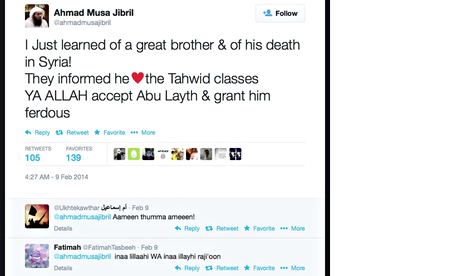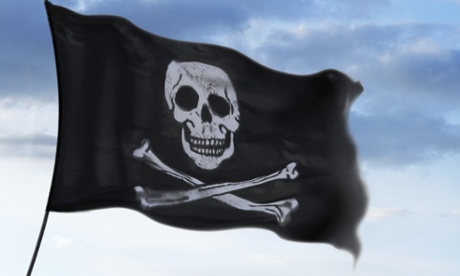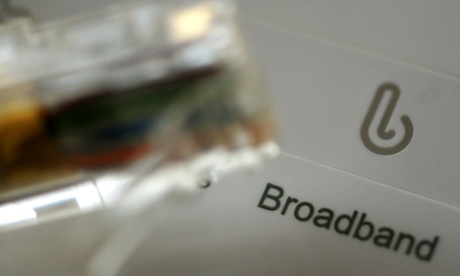Social media used to recruit new wave of British jihadis in Syria
Messages and photos posted on sites such as Twitter and Facebook provide inside track on motives and activities
http://www.theguardian.com/world/2014/apr/15/social-media-recruit-british-jihadis-syria-twitter-facebook

Summary of the story: This article talks about the one routinely perches himself on a bright pink exercise ball, the other opts for a rickety office chair. Over days, weeks and months they have used their computer screens as a portal into one of the bloodiest conflicts of the modern age in what they say is an effort to understand, engage and give a voice to those young men who choose to leave the western democracies they call home to join the insurgents in Syriafighting the Assad regime.
Key infor:
- In December estimated 1,900 people from western Europe had travelled to Syria to fight,
- social media has kept those who have joined the jihad in Syria in close contact with what is going on in the UK.
Jihad, Syria and social media: how foreign fighters have documented their war
From pictures showing a 'five-star jihad' to identifying the most influential sheikhs helping to radicalise foreign fighters, three researchers in a basement at Kings College, London, have tracked and analysed the torrent of social media posts coming from Syria.
No-makeup selfies campaign generates £2m windfall for cancer research

It
started with a row at the Oscars, featured the current obsession with
"selfies" and rapidly clogged up legions of Facebook
streams. Tens of thousands of women, egged on by their friends,
shared pictures of themselves without makeup to raise awareness of
breast cancer.
By
Friday the viral trend had transformed into a fundraising phenomenon,
generating a £2m windfall for Cancer Research UK.
The
#nomakeupselfies campaign raised the money in just 48 hours, the
charity said, with hundreds of thousands of donations from Facebook,
Instagram and Twitter users sharing pictures of themselves without
makeup and nominating a friend to do the same.
Cancer
Research UK said it had not initiated this particular campaign, but
was alerted to the #nomakeupselfies trend on Tuesday and began to ask
users to add a donation request and text code to their posts. Since
then, the money has flooded into the UK charity.
Cancer
Research UK's head of social media, Aaron Eccles, said: "We're
over the moon. When we do a social media campaign we want to engage
as many people as possible, and this has taken off like crazy."
The
idea itself appears to have begun last week when American crime
author Laura Lippman tweeted a picture of herself without makeup in
support of Kim Novak, the 81-year-old actor whose looks had been
criticised at the Oscars. The theme was picked up by celebrities and
fans of Lippman before spreading more widely.
But
for all the unexpected financial success, some commentators question
whether it is appropriate or relevant to link the "bravery"
of appearing without makeup to the very different challenge of
fighting cancer, triggering fierce debates online.
Blogger
Yomi Adegoke said: "Thinly veiling vanity as philanthropy more
than irks … the pretence these images are for anything other than
an onslaught of 'natural beauty' acclamations, coupled with pats on
the back for 'fighting the cause' makes the no makeup selfie mania
even harder to stomach."
At
some point, all the criticism prompted people to remember and then
resurrect a previous failed social media campaign – where Cancer
Research UK had attempted unsuccessfully to use selfies to raise
awareness of breast cancer.

Forget suing filesharers: in 2014, anti-piracy efforts follow the money

http://www.theguardian.com/technology/2014/apr/02/infringing-websites-list-anti-piracy
This article states that taking individuals to court over piracy isn't doing much and so in 2014 there are going to be attempts to follow the revenue generated. That means focusing their efforts on piracy sites, through three main tactics: pressuring search engines to remove links to infringing files and demote piracy sites in their rankings; forcing ISPs to block their customers from accessing those sites; and trying to squeeze their flow of advertising revenues.
 http://www.theguardian.com/technology/2014/apr/01/uk-wifi-routers-internet-attacks
http://www.theguardian.com/technology/2014/apr/01/uk-wifi-routers-internet-attacks
This article states that taking individuals to court over piracy isn't doing much and so in 2014 there are going to be attempts to follow the revenue generated. That means focusing their efforts on piracy sites, through three main tactics: pressuring search engines to remove links to infringing files and demote piracy sites in their rankings; forcing ISPs to block their customers from accessing those sites; and trying to squeeze their flow of advertising revenues.
An Infringing Website List (IWL for short) was created to gather the URLs of piracy sites and persuade brands, media agencies and ad networks to ensure they're not advertising on them.
The IWL is the result of a three-month pilot in 2013 backed by a host of creative industry bodies – the BPI and IFPI from the music industry, FACT from software, The Publishers Association from books – as well as advertising industry bodies the IAB, ISBA and IPA.
"Disrupting the money unlawful websites make from advertising could make a real difference to the fight against copyright infringement," said creative industries minister Ed Vaizey this week.
Not everyone agrees that it's such an excellent thing, however. The Pirate Party UK has criticised the initiative, pointing out that the IWL will not be made public, and that even if website owners find they are on it, it is unclear how they can apply to be removed.
I believe that it is a better and more effective way of dealing with piracy however, it won't prevent people trying to download things for free, they may attempt to go around these tactics and won't be prosecuted as everyones focus would mainly be on the sites as a whole and their owners who create the filesharing sites.
WiFi routers could be exploited for huge internet attacks in UK – study
Millions of routers worldwide vulnerable to digital criminals, 800,000 of which are in the UK, with potential for serious disruption
 http://www.theguardian.com/technology/2014/apr/01/uk-wifi-routers-internet-attacks
http://www.theguardian.com/technology/2014/apr/01/uk-wifi-routers-internet-attacks
Millions of routers worldwide vulnerable to digital criminals, 800,000 of which are in the UK, with potential for serious disruption
As many as 24m routers across the world can be used by cybercriminals to launch massive attacks on internet infrastructure, while simultaneously disrupting home connections and costing communications companies dearly.
Research shown exclusively to the Guardian showed 800,000 of those routers are based in the UK, opening up the potential for serious disruption of the country’s data networks.
Over a single day this year, Nominum said it recorded 5bn requests for such domains. This produced 12 terabytes of traffic, which is a significant amount of data flying around the internet solely for malicious means.
Nominum said over a single day in February more than 5.3m of the routers running the feature were used to generate attack traffic in Asia. An attack in January used up 70% of an internet providers Domain Name System servers.
No comments:
Post a Comment